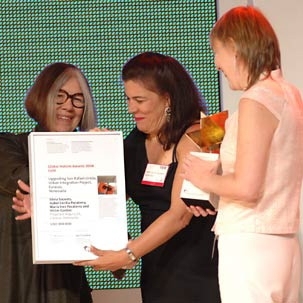In April, 700 guests from 50 countries convened in Bangkok for the culmination of a global three-year competition sponsored by the Switzerland-based Holcim Foundation for Sustainable Construction and five of the world's leading technical universities, including MIT.
Ad̬le Naud̩ Santos, dean of MIT's School of Architecture and Planning, presented $1 million in awards to the best sustainable projects. Santos headed a 14-person jury made up of leading architects, engineers and professors from 10 different countries.
Joint winners of the Holcim Gold were an urban integration project in Caracas, Venezuela, and the design for a new main railway station in Stuttgart, Germany. The winners were selected from 15 finalists from all continents, following regional contests involving more than 3,000 entries from 118 countries.
Criteria for the awards ranged from environmental and aesthetic quality to the high ethical and economic standards that the Holcim Foundation has defined in collaboration with its partner universities in Europe (ETH Zurich), North America (MIT), Latin America (USP SÌ£o Paulo), Africa/Middle East (Wits Johannesburg) and Asia Pacific (Tongji Shanghai).
In announcing that two competing finalists were awarded equal first prizes of $300,000, Santos said that both projects were outstanding: "Although engaged with intrinsically different cultural challenges, and therefore subject to different possibilities, both projects were considered by the jury to be equal in their embodiment of the aspirations of the Holcim Awards."






